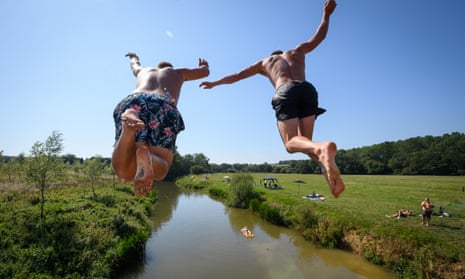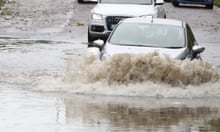In what is fast becoming a British summer ritual, the record holiday heat this week has prompted reams of cheerful forecasts and sunny headlines but far too few reminders that the climate crisis has made record-breaking a norm, according to experts.
The latest record was the 33.2C (91.8F) at Heathrow, which was five degrees higher than the hottest temperature previously registered in Britain on an August bank holiday Monday.
This was at least the third UK heat record this year, after the warmest winter day in February and a new all-time peak high temperature of 38.7C on 25 July in Cambridge.
Quick GuideHow global heating is causing more extreme weather
Show
Greenhouse gas emissions from burning fossil fuels, forest destruction and other human activities are trapping heat and putting more energy into the climate system.
Hotter air means heatwaves are much more likely. For example, scientists now say the unprecedented heat and wildfires across the northern hemisphere in 2018 “could not have occurred without human-induced climate change”. In Australia, the scorching summer of 2016-17 in New South Wales was made at least 50 times more likely by global heating, linking it directly to climate change.
Hotter air can also carry more water vapour, meaning more intense rain and more flooding.
Another important factor in the northern hemisphere is the impact of changes in the Arctic. The polar region is heating more rapidly, reducing the temperature difference with lower latitudes. There is strong evidence that this is weakening the planetary waves (including the jet stream) that normally meander over Europe, Asia and North America.
When these waves stall, weather gets fixed over regions and becomes extreme. This has been linked to past floods in Pakistan, heatwaves in Russia and drought in California.
Most of the planet’s trapped heat goes into the oceans and rising sea temperatures mean more energy for hurricanes and typhoons. The deluge delivered in the US by Hurricane Harvey in 2017 was made three times more likely by climate change. Rising sea level also means storms cause more coastal damage.
Natural variability would cause some extreme weather, even without global heating, but human impacts on the climate make such extremes more likely. Carbon Brief analysed more than 230 studies and found 95% of heatwaves were made more likely or worse by climate change. For droughts, 65% were definitely affected by our hotter world, while the figure for floods was 57%.
Most TV and newspaper reports have covered these events in jaunty tones with images of scantily clad sun-seekers, children with melting ice-creams and sweating holidaymakers downing cold drinks on the beach. The “heat and the glory” read Monday’s splash in the Daily Mail, which made the scorching weather just another obstacle that the England cricketer Ben Stokes had to overcome in his epic innings against Australia.
Although there appears to be more focus than in the past on the impact of man-made global heating, climate experts say the balance is still skewed away from the worrying reality of climate disruption, which has crammed all of the UK’s 10 hottest years into the period since 2002.
This is part of a global trend. July was the world’s hottest month ever recorded, following the warmest June. The extreme heat is particularly unusual because this is not an El Niño year – the phenomenon usually associated with prolonged temperature surges. Scientists say the record-shattering temperatures seen in Europe last month were a one-in-a-thousand-year event made up to 100 times more likely by the greenhouse gases that humans have put into the atmosphere.
The Met Office says the worrying long-term trend is clear, but not always easy to balance with the short-term focus on pleasantly (for most people) unusual warmth.
“It’s a challenge,” said Grahame Madge of the Met Office. “As a national weather forecaster, we want to give people advice on what they need to do to prepare for the day ahead. But we also wear a climate hat that means we must advise when we think conditions are influenced by climate change.”
Q&AWhy is the Guardian changing the language it uses about the environment?
Show
The Guardian has updated its style guide to introduce terms that more accurately describe the environmental crises facing the world. Instead of “climate change”, the preferred terms are “climate emergency, crisis or breakdown” and “global heating” is favoured over “global warming”.
The scale of the climate and wildlife crises has been laid bare by two landmark reports from the world’s scientists. In October 2018, they said carbon emissions must halve by 2030 to avoid even greater risks of drought, floods, extreme heat and poverty for hundreds of millions of people. In May 2019, global scientists said human society was in jeopardy from the accelerating annihilation of wildlife and destruction of the ecosystems that support all life on Earth.
The editor-in-chief, Katharine Viner, says: “We want to ensure that we are being scientifically precise, while also communicating clearly with readers on this very important issue. The phrase ‘climate change’, for example, sounds rather passive and gentle when what scientists are talking about is a catastrophe for humanity.”
Other terms that have been updated include the use of “wildlife” rather than “biodiversity”, “fish populations” instead of “fish stocks” and “climate science denier” rather than “climate sceptic”.
Damian Carrington Environment editor
Other experts said the Met Office, along with the BBC, should go further and be proactive about linking the weather with the climate.
“At the moment, the Met Office seems to be afraid to talk about climate change. For instance, it published State of the UK Climate 2018 last month, which listed key trends in rainfall and temperature but did not mention climate change,” said Bob Ward of the Grantham research institute on climate change and the environment at the London School of Economics.
Research suggests people base their view of long-term trends on their recent experiences, which can be misleading. Ward said weather presenters could help to overcome this perception shortfall. “Weather presenters can provide overviews of the trends to help people make sense of their own experiences and allow them to think about how risks will change,” he said.
Calculating the influence of climate change is a complex process because it differs from place to place and from day to day according to the interplay of natural fluctuations and human forcing.
Attribution studies are run through supercomputers, and the process is becoming faster, which means it may one day be used alongside weather forecasts. Karsten Haustein of the environmental change institute at the University of Oxford said results could technically be provided within one to three days, though there are currently insufficient staff to perform this task frequently.
This week’s heatwave is the third of the summer and likely to be the shortest. Tuesday was also freakishly hot for the time of year – registering 32.9C at Heathrow – but the Met Office says a cooler front will prevail from Wednesday until at least the end of the week.









